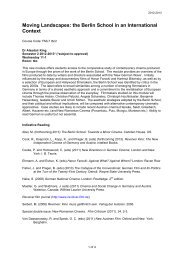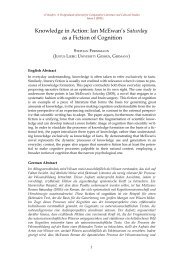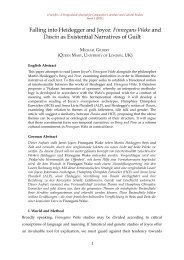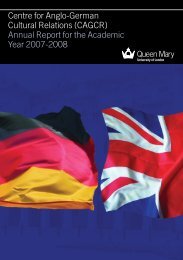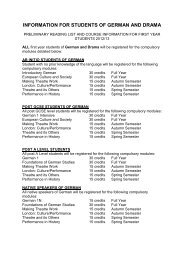Student Handbook - The School of Language, Linguistics and Film
Student Handbook - The School of Language, Linguistics and Film
Student Handbook - The School of Language, Linguistics and Film
Create successful ePaper yourself
Turn your PDF publications into a flip-book with our unique Google optimized e-Paper software.
passive <strong>and</strong> active language skills from hearing, reading, speaking <strong>and</strong> writing that language<br />
as the unique means <strong>of</strong> communication.<br />
Other objectives are:<br />
• to provide you with the opportunity to learn about the general culture <strong>of</strong> the country or<br />
countries which you visit<br />
• for you to investigate aspects <strong>of</strong> that culture <strong>and</strong> engage in personal research<br />
• to help you develop confidence <strong>and</strong> resilience through exposure to other bureaucracies<br />
<strong>and</strong> other ways <strong>of</strong> life<br />
• to learn invaluable transferable skills<br />
• to give you an insight into different educational <strong>and</strong> working structures, whether as an<br />
assistant teacher, as a student in a university, or undertaking an internship, <strong>and</strong> to<br />
enable you to participate in <strong>and</strong> adapt to those structures<br />
<strong>Student</strong>s who study two languages are able to split their Year Abroad between two countries<br />
if they wish to.<br />
Most <strong>of</strong> you will spend your year abroad either as a English <strong>Language</strong> assistant on<br />
placements arranged by the British Council, or as a university student, either under the EUfunded<br />
ERASMUS scheme which <strong>of</strong>fers exchanges with other European Union universities,<br />
or as an independent student or on an independently arranged work placement. All students<br />
are bound by a contract signed before or on taking up their places or positions, <strong>and</strong> you<br />
must take care to honour it. <strong>The</strong> various certificates which students are required to produce<br />
on their return, the reports written by the institutions or companies in which they have spent<br />
their time, visits made by members <strong>of</strong> staff from Queen Mary to students abroad, <strong>and</strong> the<br />
close contact maintained by Queen Mary both with the institutions responsible for its<br />
students <strong>and</strong> with the students themselves, are all <strong>of</strong> great importance.<br />
An initial meeting to inform you about your options is held at the end <strong>of</strong> your first year. This<br />
is followed by a series <strong>of</strong> briefing meetings throughout your second year <strong>and</strong> backed up by<br />
written year abroad h<strong>and</strong>books. It is vital that you attend all <strong>of</strong> these meetings <strong>and</strong> take note<br />
<strong>of</strong> the guidelines. If you need more information, please seek it from the following: French –<br />
Dr Laetitia Calabrese; German – Dr Annja Neumann; Spanish – Dr Mar Encinas-Puente;<br />
Portuguese – TBC (Instituto Camões Instructor); Russian – Mrs Anna Pilkington. You may<br />
also refer to Mrs Heather Heiner, the Administrator responsible for the year abroad.<br />
6.1 YEAR ABROAD FUNDING ARRANGEMENTS<br />
<strong>The</strong> following arrangements apply to students undertaking the Year Abroad in 2012-13.<br />
<strong>Student</strong>s should be aware that funding arrangements are subject to review on a yearly basis<br />
<strong>and</strong> the information in this section may change by the time you come to undertake your Year<br />
Abroad.<br />
<strong>The</strong> amount <strong>of</strong> funding that you receive will depend on your tuition fee status AND in on the<br />
country or countries in which you will be undertaking your Year Abroad Placement.<br />
<strong>Student</strong>s who qualify for HOME fee status (this includes UK students, EU students,<br />
students who are permanently settled in the UK or who have refugee status) AND who will<br />
be on a study or work placement (including British Council <strong>Language</strong> Assistantship) within<br />
the European Union <strong>and</strong>/or Switzerl<strong>and</strong> for a minimum <strong>of</strong> 24 weeks (this can include split<br />
placements) will receive:<br />
A tuition fee waiver. No fees will be payable to Queen Mary or to your host institution<br />
(if studying under the ERASMUS scheme) for the academic year 2012-13.<br />
A small ERASMUS grant<br />
59



